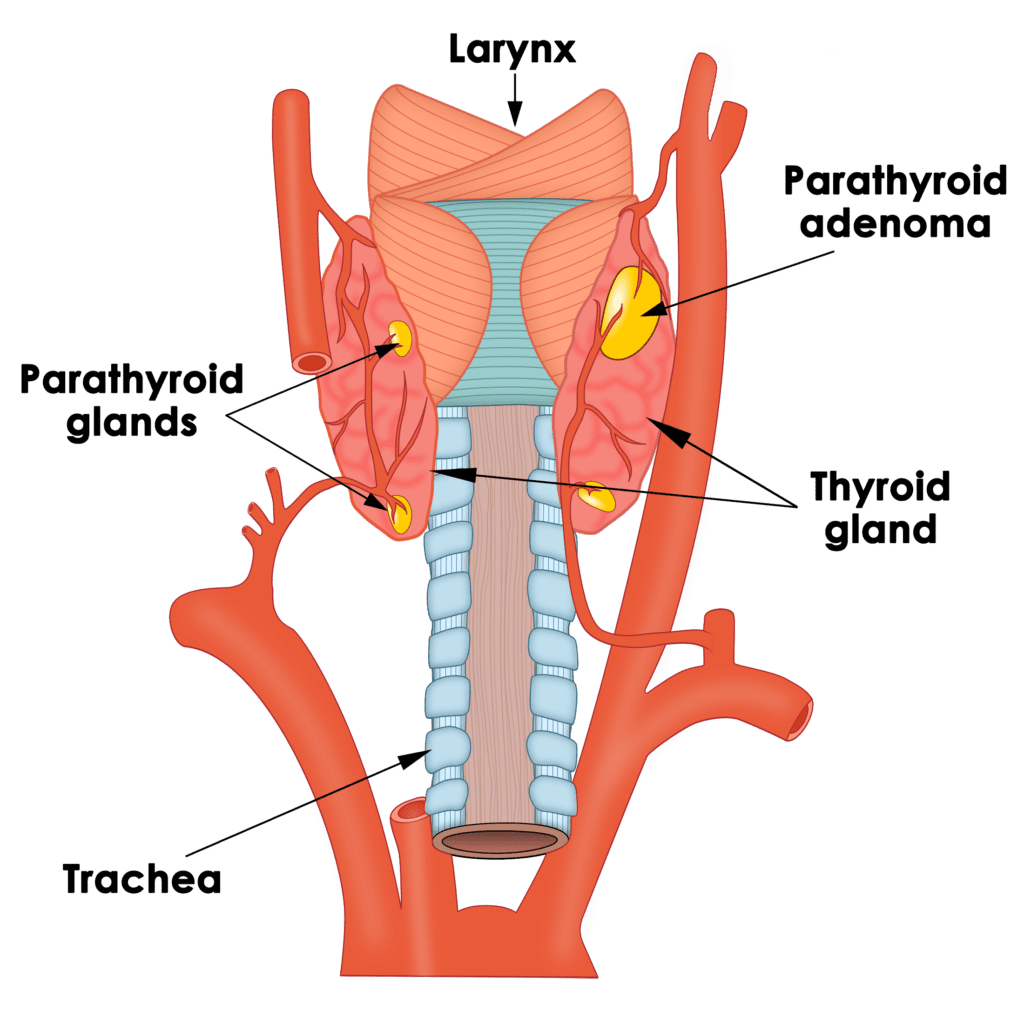Dr Ben Lancashire is a specialist endocrine surgeon. He has expert training in surgical management of parathyroid gland disorders.
What are the parathyroid glands?
The parathyroid glands are responsible for regulating calcium levels in the blood by secreting parathyroid hormone (PTH). A normal parathyroid gland is small – not much bigger than a grain rice. There are usually a set of four parathyroid glands (two on each side) located in the neck behind the thyroid gland. Location of the glands can vary however – some are found as low down as the chest cavity.


What causes hyperparathyroidism?
Hyperparathyroidism occurs when there’s an abnormally high concentration of parathyroid hormone (PTH) in the blood due to overproduction of hormone by the parathyroid glands. Hyperparathyroidism can be diagnosed as primary (most common), secondary, or tertiary hyperparathyroidism.
Primary hyperparathyroidism occurs when one or more parathyroid glands become enlarged and begin producing excessive PTH. This causes blood calcium levels to rise. Causes of primary hyperparathyroidism include:
- A single benign (non-cancerous) tumour called a parathyroid adenoma (~85%)
- Multiple benign (non-cancerous) parathyroid adenomas (10%)
- Parathyroid hyperplasia (5%)
- Parathyroid cancer (<1% -very rare)
Secondary hyperparathyroidism occurs when abnormally low blood calcium levels prompt the parathyroid gland to increase production of PTH in effort to increase calcium levels to a normal level.
Tertiary hyperparathyroidism occurs after longstanding secondary hyperparathyroidism and involves ongoing excessive PTH secretion which results in high calcium levels in the blood.
What are the symptoms of hyperparathyroidism?
Healthy blood calcium levels are required for normal functioning of the heart, muscles and nerves as well as bone strength. High calcium levels can cause many symptoms within the body. If left untreated, the range of symptoms of hyperparathyroidism can include:
- Joint and bone pain
- Bones that easily break (osteopenia or osteoporosis)
- Muscle weakness
- Tiredness or fatigue
- Depression
- Forgetfulness
- Difficulty concentrating
- Kidney stones
- Excessive urination
- Nausea and vomiting
- Loss of appetite
- Constipation
How is hyperparathyroidism diagnosed?
Often, people don’t have any symptoms of hyperparathyroidism, but a routine blood test (performed for unrelated reasons) may show a high calcium level prompting further investigations for a parathyroid problem.
Investigations for suspected hyperparathyroidism are usually first arranged by a GP or Endocrinologist. This may involve a combination of blood tests, urine tests and medical imaging (neck ultrasound, bone mineral density scan, Sestamibi scan or 4D Parathyroid CT scan).
These tests can diagnose whether you have hyperparathyroidism but may not always reveal where the abnormal gland is. There are a few other specialised scans and tests that Dr Lancashire will arrange if necessary.
Treatment of hyperparathyroidism
Parathyroid surgery is the only effective treatment for primary hyperparathyroidism. There are no medications that can cure primary hyperparathyroidism.
For people without any symptoms, there are guidelines that may help you decide if you should consider surgery. Dr Lancashire will be able to discuss with you further whether you will benefit from surgery.
Your first appointment with Dr Lancashire
On the day of your first appointment with Dr Lancashire, please arrive at the clinic 10 minutes early. This allows time to complete a New Patient Registration form.
At the first appointment you will discuss your condition, including a full medical history and examination. Sometimes a second appointment is needed for matters that require reflection on treatment options or additional testing.
Dr Lancashire will discuss your diagnosis and let you know if further appointments, surgery, or medications are recommended. If so, any questions you may have will be answered, and Dr Lancashire will liaise with your referring doctor.
Book your appointment today.


